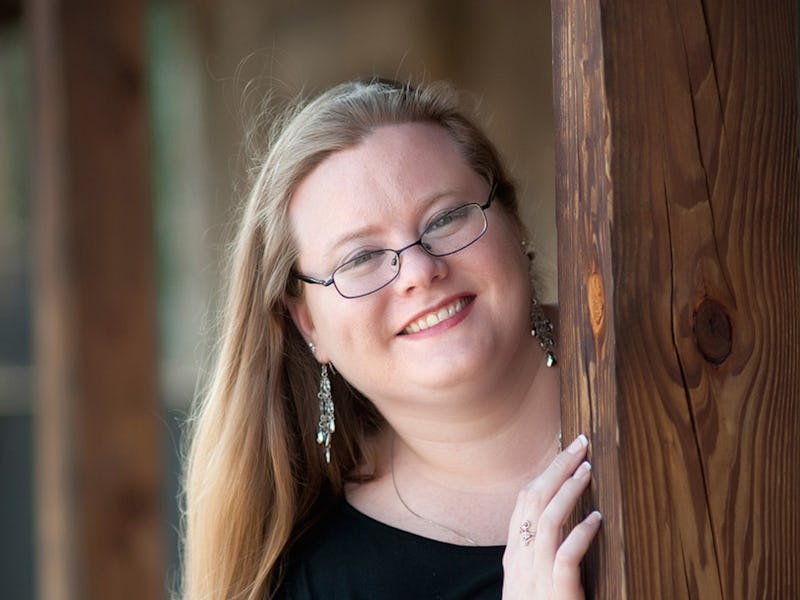Beth Revis on Creating Young Adult Space Operas
The author of 'Across the Universe' and the upcoming 'Star Wars: Rogue One' novel talks the expanding science fiction genre.

In Ask a Prophet, we use our alien probes on the brains of sci-fi, fantasy, and speculative fiction writers.
This week, we spoke with Beth Revis, a science fiction writer best known for her YA Across the Universe trilogy and A World Without You. Her next book will be a Star Wars story about the Rogue One protagonist Jyn Erso.
Did you specifically set out to write YA sci-fi set in space when you started Across the Universe?
Across the Universe is basically a murder mystery in space. I was aware that there wasn’t much sci-fi in young adult fiction, but I knew that the story itself was YA. There was a moment when I went into my local bookstore and I asked for all the young adult science fiction titles so that I could see the market. So they gave me The Hunger Games and The Host by Stephenie Meyer. And I was like, “Ok this is good, but I want something set in space.” So she gave me Orson Scott Card’s Ender’s Game, and I said, “Ok, this is good, but can I have something that was published after I was born?” She had nothing in the store that fit that. I was terrified that the book would never find a home because of that, but ever since then the genre has just blown up. There are so many good young adult science fiction novels out now.
What has it been like for you to be part of a genre that’s blown up as you have become involved in it?
It’s been amazing to see. It felt almost like I was in the middle of something glorious happening in the art world. Before the book came out, it felt that no one would want it, but once it was out and everybody was snatching up sci-fi, it felt like I was in the middle of a confetti storm.
What did you do background research on to write the book?
I have always been fascinated by astronomy and learning about space. And as I was writing Across the Universe specifically, I learned enough through my studies that I could start the story and get going, but whenever I got to a point where I couldn’t answer the question with science, I had to research why we didn’t have it. For example, we don’t have cryogenic freezing right now because the membranes of our cells burst. And so I invented blue goo to make up for that. So it became sort of a puzzle to research as much as I could until I got to the point where science couldn’t answer anything more and then invent fiction to go with it.
Research is always kind of like an iceberg, the reader sees the little peak up at the top, but there’s so much below that that never makes it into the book. When I was writing Shades of Earth, I was lucky enough to get invited to go to the Johnson Space Center and have a private tour of the International Space Station, and I learned so much there that I wish I could have found a way to put in the book, but by that time, everything was already written and I wasn’t able to do it. But it was just fascinating to learn about the troubles that astronauts have that we don’t even think of, and that’s the part that I wish I could’ve explored more.
As sci-fi becomes more popular across all mediums, are there any shows you currently follow?
I absolutely adore Firefly by Joss Whedon. One of my characters is named Kaylee specifically after the character in Firefly. I’m a total Whovian; I love Dr. Who. And I cut my teeth on science fiction with Star Wars. My brother’s name was Luke and I always had really long hair, so growing up I would do my hair in little buns and my brother would have his PVC pipe of a lightsaber, and we would spend hours playing with it.
What do you like best about sci-fi?
The best science fiction is a mirror of our world and it reflects the way we are right now. But really good science fiction is also a window that gives us a peak into an aspect of humanity that we are not always familiar with. So the best science fiction does both — reflect and reveal aspects of our society that a lot of times, we don’t consider. It usually does it in a really fun way that involves blowing up stuff in space.
I love the way science fiction — especially in young adult literature — is embracing diversity. That sounds kind of trite because diversity is such a buzz word right now, but young adult science fiction is really pushing the boundaries not just of what the future can be like, but how we can perceive the present today. A really great example of that is Alexandra Duncan’s book Salvage. It covers aspects of our world today — like the Pacific garbage problem and Indian culture and religious cults — but puts it in a science fiction setting that makes it more accessible to the everyday reader. That is just a brilliant way of using the unfamiliar aspect of science fiction to bring forward the unfamiliar aspects of our current world and make us empathize with the way the world is now.